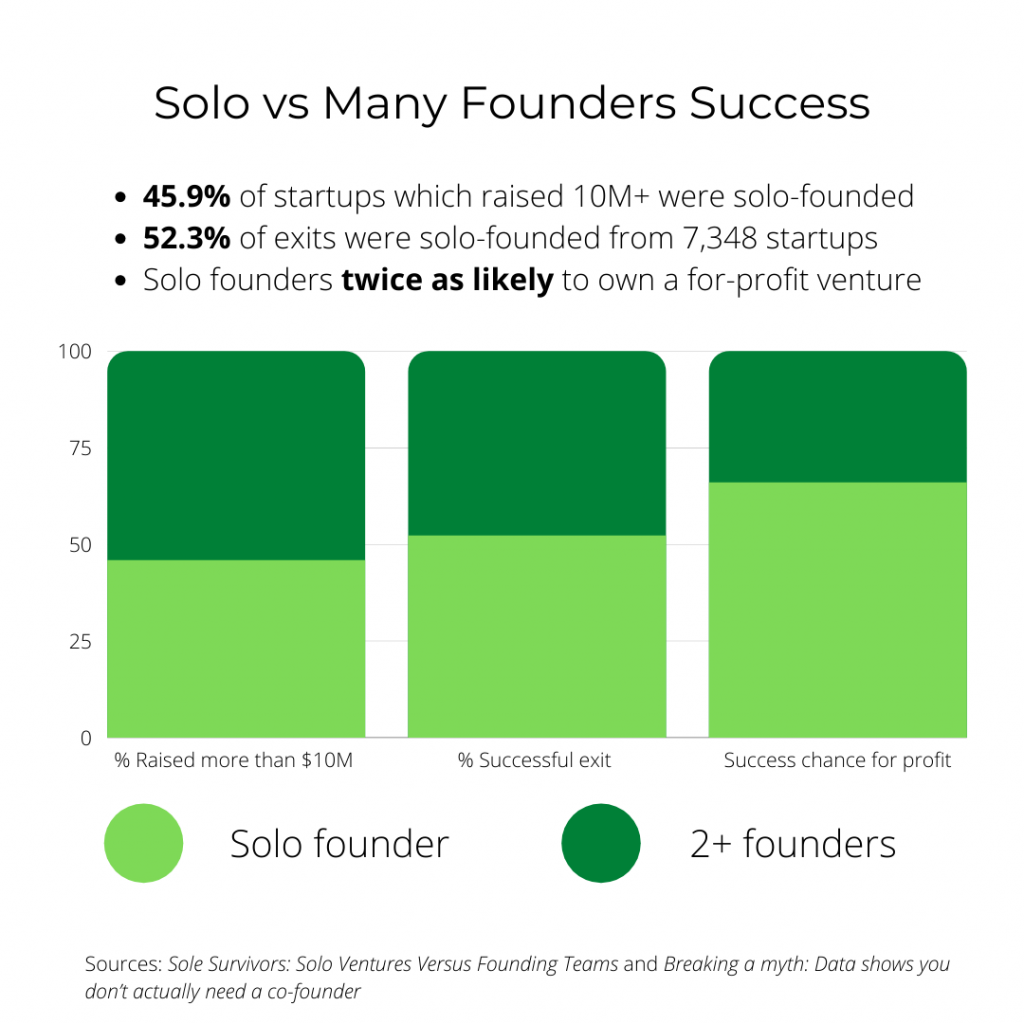
Dear professional programmer, do you want to make a good living working on your ideas the way you like? If yes, the Solo Developer Startup is an answer! Why your single-person startup can be a success and change your life for the better?
1. Unconstrained freedom of solo creation
Working for companies is an excellent choice for most of us. Yet, many developers want to have full control over their work.
These developers want to work for themselves and be free from their companies’ rules and politics. They wish to get income based on the results of their hard work – and not their positions or working hours. And most of them love deep silent work and an unrestrained creation of awesome software!
2. An independent and rewarding artisan’s life
Working for your startup is purposeful as an artisan’s life. You can make more money if you solve people’s problems well and make them happy. Over time, you can craft a great solution based on your practice and customer feedback.
You gain independence from the fixed location and hours of the workplace. Once your single-person startup makes enough money, you can travel and live anywhere you want.
You can have financial freedom and enjoy the lifestyle of your choice within a short period. It is rare for a full-time job with any organization to give you all this. The companies want to control your work, career growth, and income to suit their interests. They do not care about your aspirations and long-term goals.
3. Software development is a rare single-person-startup-friendly profession.
You can run a small software business by yourself from the comfort of your home with low expenses. All you need is a good computer, web hosting, and a small workspace.
Unlike many other businesses, your core activities can be minimal. You only need to create, market, and support your product:
- Creation – you can build a startup software code and a simple website for your product yourself. You are not dependent on others for this most important activity. And you can always hire freelancers for a short time if you lack a specific skill or need help.
- Marketing – you can market your product online using the web site, social media, and digital marketing. The Internet is the best platform right now to promote and sell software.
- Support – people are comfortable now with online communication and customer service. You can support thousands of people with the right tools, help articles, and automation.
Software is challenging to create but easy to provide for many users. You don’t need expensive equipment, supplies, vendors, or high operating costs. Your business can be virtual, automated, and completely self-sustaining. If your idea is right, you can make good money while enjoying what you do!
While working alone in my underwear on the side of my hotel bed with my MacBook and my coffee, I was able to outcompete million-dollar VC-funded teams of 30+ people in an office in San Francisco with Aeron chairs, oakwood meeting desks, $20,000 espresso machines, bean bags, and ping-pong tables.
– Pieter Levels, founder of Nomad List
4. But can I run a single-person startup and do everything by myself?

People and organizations bring necessary things that we miss working solo:
Management
Organizations direct you, manage your projects, and day-to-day tasks. They carry out research, analysis, and corrections to support your work. Leaders guide your learning and career path.
Solo:
Turn yourself into your own ruthless boss and a learning machine that is directed by the needs of the business.
Scale
More people with more resources can do much more. Organizations provide finances, equipment, and infrastructure for your work. As an employee, all you need to care about is your narrow area of responsibility. People can help when you are sick or have problems. They decrease the risks of the business running out of steam or being unable to grow. In the end, organizations with resources have higher survival chances.
Solo:
Become a strategist and an optimizer. Solve a small but important deep problem with your software. Select the essential startup activities that fit your capacity, skills, and energy. Focus on core work and outsource short-term secondary tasks. Optimize the time, money, and resources you need for your business.
Automate business as much as you can and ask for temporary help when it is not possible to do it yourself. Your downtime or vacation periods shouldn’t affect the operations. You have to take a lot of care of your health, emotions, and mind to be a smart energetic beast.
Teams
You work with people whose skills and experiences exceed yours in many areas. You are learning and getting better by working with competent professionals. They bring a lot of good ideas and insights. Healthy teams brainstorm, create new perspectives, and produce superior solutions. They change your mind for the better.
Solo:
Open your mind, avoid biases, and question your ideas all the time. Experiment with many hypotheses to find what works and what does not. Your customers and problems will confirm your decisions and guide your future actions. Your real-life experiences will strengthen your expertise with time and business growth.
Be focused, resilient, and smart if you still decide to do everything yourself. You will lack time, money, energy, skills, and clarity. You will face a lot of hard choices without the life support of teams, processes, and bosses. But, I guarantee – you will have an exciting time!
Finally, solo founders have better chances for success than multiple startup founders.

5. OK, should I start my single-person startup?
Many of you will say – Not sure. We love our jobs and team, eight working hours, free coffee, and a stable salary even if we do little. We are comfortable and don’t want to worry about uncertain outcomes, unscheduled hard work, and challenge ourselves all the time.

I would say – YES, start if you have the time, skills, and desire!
You don’t need super talent, sacrifices, or impossible luck to build a startup. But, you will need consistent and right moves with intense learning.
What you need is to dig out of the comfort zone that your company has put you in where you only need to write software. You have to act in new areas, drive yourself steadily, and take risks.
You can continue working for your company while spending free time on your solo startup. During this transition, you can learn about the new business, research the market, and develop the first version. Even if you fail, your skills will be sharper and in higher demand after your startup journey ends. And you can do a lot if you free some time from the job overtime, family, parties, routine, or playing games.
You will also need some good ideas to start. But if you improve upon the initial imperfect ideas as you go, you will have a pretty good chance of building a thriving business. You can create software that people love and are willing to pay for.
Yes, I recommend you take the opportunity to create your very own Solo Developer Startup.
It’s not easy. But if your startup works – it will make your life more meaningful, rewarding, and exciting. And one person startups have already become a source of living for many developers.
What is next?
I want to share my experiences of walking down this path – of making a Solo Developer Startup. I decided to do it after my 40th birthday and after 20 years of working as a software programmer. It is never too late to start 🙂
I’ll focus on the following topics for the busy solo developer who has no time to waste:
- Choosing and testing startup ideas.
- Evolving idea concepts, architecture, and implementation.
- Shaping your ideas and offerings to attract people.
- Marketing your software and getting visitors.
- Converting visitors into paying customers.
- Building user support and customer happiness.
- Automating business and avoiding wasteful moves.
- Organizing and supporting yourself to work on a startup.
See you in the next post.

Thanks for sharing theses ideas. I would also love to know your perceptive regarding balancing between family, day job and startup.